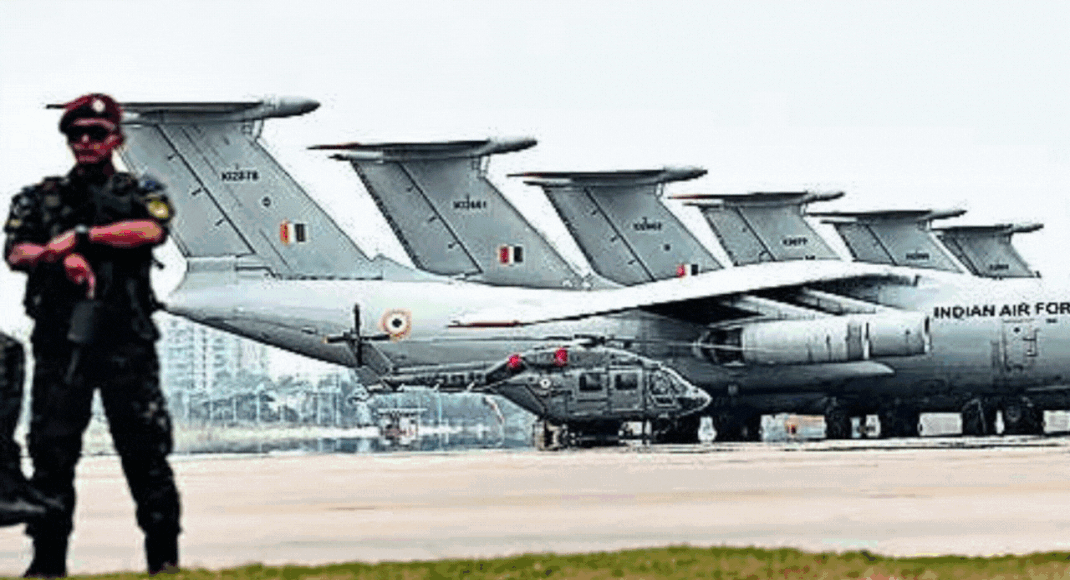
[ad_1]
NEW DELHI: With the threat of terror attacks on military establishments remaining a clear and present danger, the IAF has now kicked off a plan to upgrade the ground perimeter security of 30 more of its air bases around the country.
The new comprehensive multi-layered, multi-sensor, hi-tech surveillance and intrusion detection systems at the 30 air bases will follow the ongoing installation of a similar integrated perimeter security system (IPSS) at 23 “crucial and sensitive” air bases.
“Of the 23 high-priority air bases, the IPSS is now functional at 17-18 after some delay. Now, the plan is to install the IPSS, with some additional features and upgrades, at 30 more air bases,” a senior officer told TOI.
The government had approved the IPSS for the first 23 air bases, with Bharat Electronics (BEL) as the lead contractor and several foreign sub-contractors, after JeM terrorists attacked the Pathankot airbase in January 2016 to expose gaping holes in the security set-up of military installations. The “pilot” IPSS project at the Pathankot airbase was subsequently launched, and eventually commissioned in February 2021.
As per the request for information (RFI) now issued to Indian companies, IAF wants the IPSS at the 30 air bases to have five layers for intrusion detection and monitoring, which will all be integrated with AI-enabled software and automation network, for “a composite surveillance picture with video analytics to generate decision-making solutions”.
The layers will include an electrical smart power fence, CCTV cameras with infra-red illuminators, radars, underground vibration detection systems (UVDS) with dedicated optical fibre cables, and dual PTZ (pan, tilt, zoom) thermal and visible cameras.
Moreover, the gap-free system should also have mini UAVs (unmanned aerial vehicles) for aerial surveillance. “The UVDS should be capable of detecting vibrations generated by human intruders while walking, crawling and tunnelling across the perimeter,” another officer said.
IAF has asked vendors to submit their response to the RFI by June 24, in a move that comes soon after Baloch militants attacked yet another naval air base in Pakistan on March 25.
In India, the need to urgently revamp the security infrastructure around military installations and bases has also been repeatedly reinforced by the series of terror strikes on Pathankot, Uri, Nagrota, Akhnoor and other camps in recent years.
The low-cost, high-impact attacks exposed several chinks in the existing set-up, ranging from the lack of proper perimeter security and upgraded standard operating procedures to the absence of regular security audits and seamless coordination between intelligence and security agencies.
During the Pathankot strike in January 2016, it had taken the security forces, who lost seven of their own personnel, almost three days to kill the four heavily-armed JeM terrorists who had easily slipped into the air base. The incident had come soon after PM Narendra Modi made an unscheduled trip to Lahore to attend the wedding of Nawaz Sharif’s granddaughter there, leading to a nose-dive in bilateral ties.
The new comprehensive multi-layered, multi-sensor, hi-tech surveillance and intrusion detection systems at the 30 air bases will follow the ongoing installation of a similar integrated perimeter security system (IPSS) at 23 “crucial and sensitive” air bases.
“Of the 23 high-priority air bases, the IPSS is now functional at 17-18 after some delay. Now, the plan is to install the IPSS, with some additional features and upgrades, at 30 more air bases,” a senior officer told TOI.
The government had approved the IPSS for the first 23 air bases, with Bharat Electronics (BEL) as the lead contractor and several foreign sub-contractors, after JeM terrorists attacked the Pathankot airbase in January 2016 to expose gaping holes in the security set-up of military installations. The “pilot” IPSS project at the Pathankot airbase was subsequently launched, and eventually commissioned in February 2021.
As per the request for information (RFI) now issued to Indian companies, IAF wants the IPSS at the 30 air bases to have five layers for intrusion detection and monitoring, which will all be integrated with AI-enabled software and automation network, for “a composite surveillance picture with video analytics to generate decision-making solutions”.
The layers will include an electrical smart power fence, CCTV cameras with infra-red illuminators, radars, underground vibration detection systems (UVDS) with dedicated optical fibre cables, and dual PTZ (pan, tilt, zoom) thermal and visible cameras.
Moreover, the gap-free system should also have mini UAVs (unmanned aerial vehicles) for aerial surveillance. “The UVDS should be capable of detecting vibrations generated by human intruders while walking, crawling and tunnelling across the perimeter,” another officer said.
IAF has asked vendors to submit their response to the RFI by June 24, in a move that comes soon after Baloch militants attacked yet another naval air base in Pakistan on March 25.
In India, the need to urgently revamp the security infrastructure around military installations and bases has also been repeatedly reinforced by the series of terror strikes on Pathankot, Uri, Nagrota, Akhnoor and other camps in recent years.
The low-cost, high-impact attacks exposed several chinks in the existing set-up, ranging from the lack of proper perimeter security and upgraded standard operating procedures to the absence of regular security audits and seamless coordination between intelligence and security agencies.
During the Pathankot strike in January 2016, it had taken the security forces, who lost seven of their own personnel, almost three days to kill the four heavily-armed JeM terrorists who had easily slipped into the air base. The incident had come soon after PM Narendra Modi made an unscheduled trip to Lahore to attend the wedding of Nawaz Sharif’s granddaughter there, leading to a nose-dive in bilateral ties.
[ad_2]
Source link








